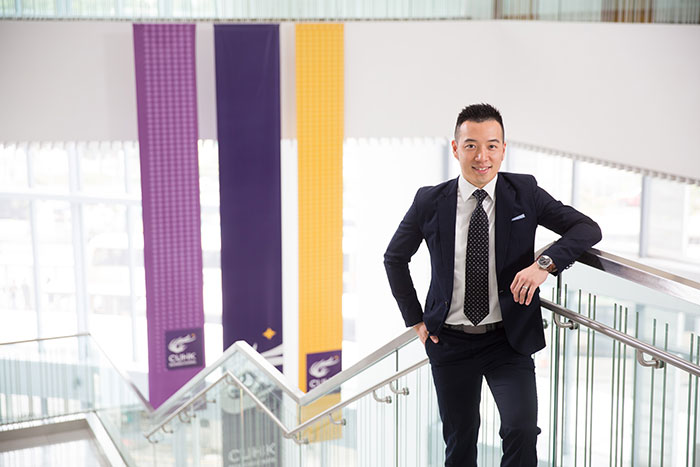I was stuck as an AVP but became a senior leader in Asian banking. Here’s how

Media Coverage by eFinancialCareers:
In 2012 Johnston Lo was working as a broker at one of the world’s leading banks, HSBC, and had got to assistant vice president level.
But despite his early success in banking, he’d also reached what he describes as a “bottleneck” in his career. “I was skilled enough to perform my day job, I had enough clients, and I was already an AVP in my team,” says Lo.
“Yet I was also stuck at this mid-level. If I’d stayed in the same firm, further promotions would have become more difficult,” he explains. “While my experience was good, it wasn’t enough to step into a senior leadership role.”
Johnston realised that to get ahead he needed to further improve his leadership skills. And after researching potential qualifications, he decided to enrol in the MBA programme at the Chinese University of Hong Kong.
“CUHK’s MBA stood out because it has both an Asian and international focus to its teaching and because it aims to produce the next generation of Asian leaders,” says Lo. “After talking to CUHK alumni, I knew it would allow me to meet new people and get new perspectives on management. It would take me out of my comfort zone and help get me a senior leadership job.”
The MBA lived up to Lo’s expectations. He used his new leadership skills to move into a completely different working environment (at Bank of China International), at a higher rank (he’s now an associate director).
But Lo’s leadership talents were put to the test even before he got into the classroom at CUHK. He first met his MBA cohort on an Outward Bound course – a week of tough problem solving and muddy outdoor adventure in Hong Kong’s New Territories.
“Put into small groups, we’d take turns to be leaders on different assignments. Using maps and compasses to that extent was a completely new and exciting experience,” says Lo. “One night there was a midnight trek from base camp to a check point – if you went the wrong way, you had to start over. It was leadership and teamworking under pressure.”
Lo says that at Outward Bound he began to learn some of the leadership skills that would be reinforced during the CUHK modules. “For example, we had to adjust our leadership styles to suit different individuals because the group was very mixed. We had people from several industries and from countries as diverse as China, the US and Finland.”
It was a similar experience when Lo was working in equally diverse case study groups at CUHK. “The MBA teaches you to become an all-round leader who can face different types of colleagues in different types of workplaces,” says Lo.
“It makes you more open minded when dealing with new people and coping with change as a leader. These elements to leadership are vital in an industry which is evolving as rapidly as Asian banking,” he adds.
Lo says the MBA helped him to make a smoother transition into his job at BOCI. “Compared to a Western bank, it’s very different in its organisational structure and company culture. But my MBA had already taught me to be flexible in order to handle this change.”
He now has a “tool kit” of leadership techniques that he believes will put him on the path for continued success in the Asian finance sector.
“If you’re leading people with a similar amount of experience as you, for example, you could use a ‘partnership approach’, in which you often ask for their opinions. They won’t help you as much if you give direct commands,” says Lo.
Alongside working with peers in case study groups, CUHK students also hone their leadership expertise during lectures.
“The faculty comes from all over the world and are specialists in their fields, including investment banking. They share practical experience of leadership, not just textbook knowledge,” says Lo. “They also invite current business people to provide real-time experiences of leadership challenges.”
CUHK offers an Asia-focused leadership development module on its MBA programme, which aims to make students more aware of their own strengths and weaknesses as managers, so they can lead people more effectively in the workplace.
The school’s emphasis on leadership is infused throughout the MBA. “For example, I took a module on salesmanship and sales management, and the professor told us that successful leaders all have good sales skills, even those not in client-facing roles,” says Lo.
“To be a leader you must be able to sell ideas within your bank. If you see a good investment opportunity, for example, you must get the buy-in of others in your team,” he adds.
Lo improved his leadership skills by trial and error during the MBA. “Compared to being at work, CUHK is a much safer environment in which to learn. Case study groups allow you to make mistakes and learn from them, without the negative financial consequences you’d get at a bank.”
CUHK students still need to work hard if they want to develop their leadership abilities, says Lo. “If you’re in charge of a group, you have to know all the materials in advance, so you can set the right direction when you lead. Most of your team members will be managers themselves, so you’ll want to be as prepared as possible.”
Being able to foster a culture of teamworking is an important part of any leadership project at CUHK, says Lo.
“One of the best things about my MBA is that I worked so closely with my classmates and have kept in touch with many of them since we graduated. My Outward Bound group still meets for regular dinners. The friendships you form at CUHK last for many years – and as you rise up the ranks as a leader, you can always call on someone for advice.”
Media: eFinancialCareers
Section: News
Date published: May 10, 2017

